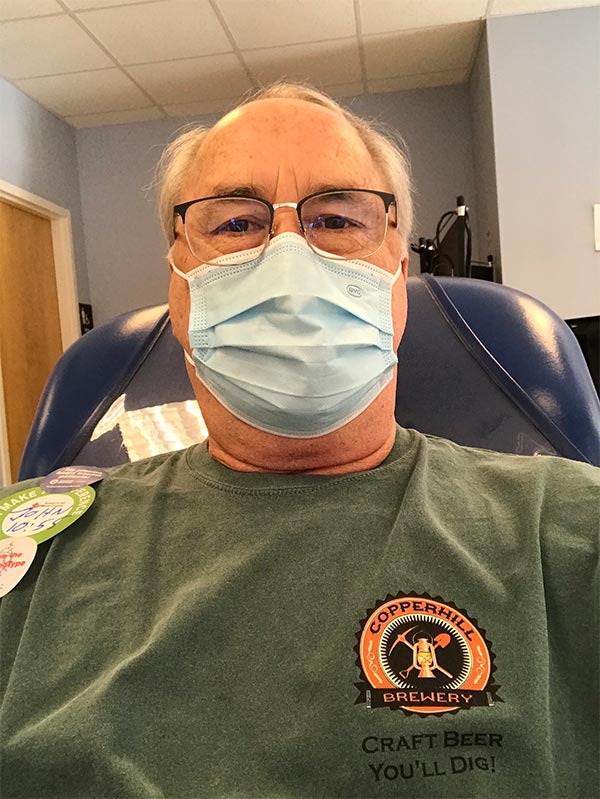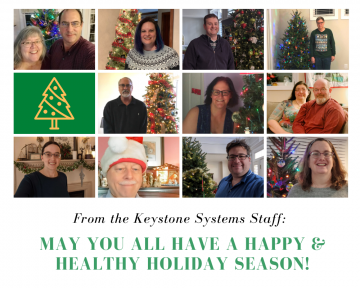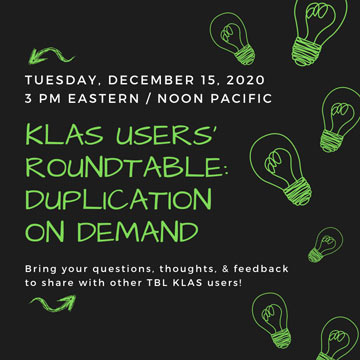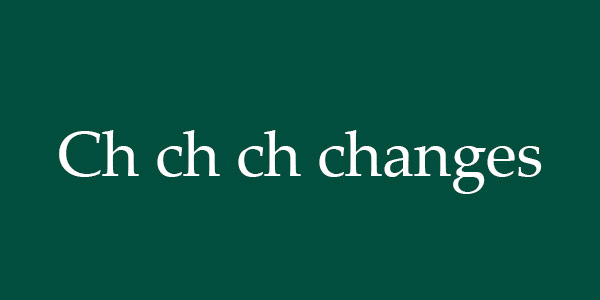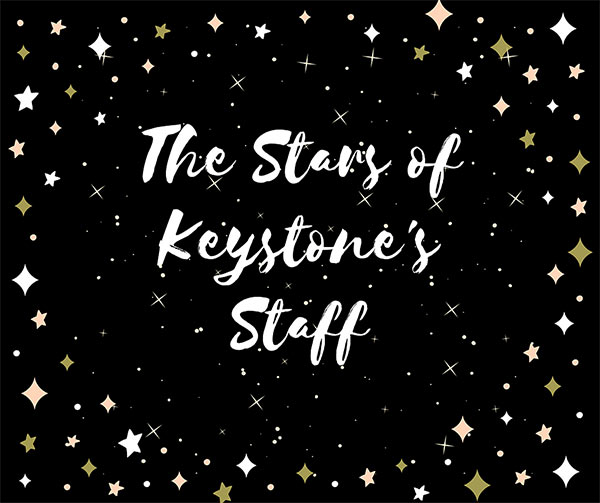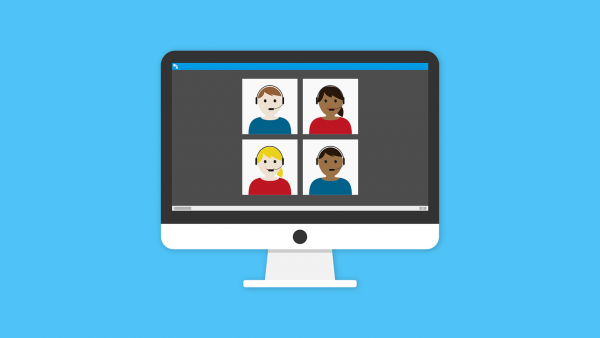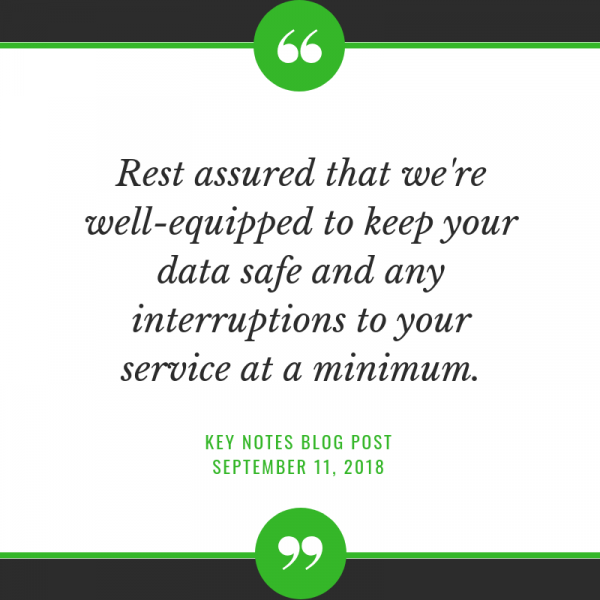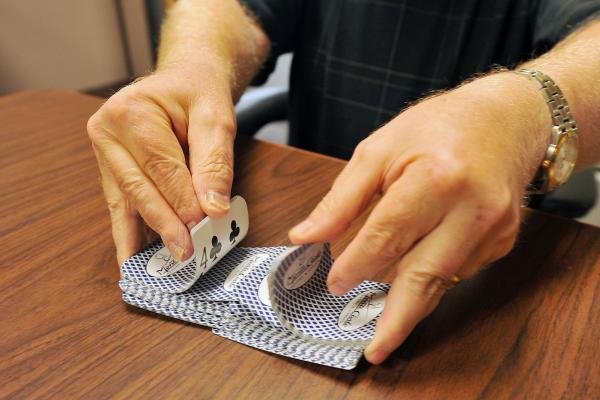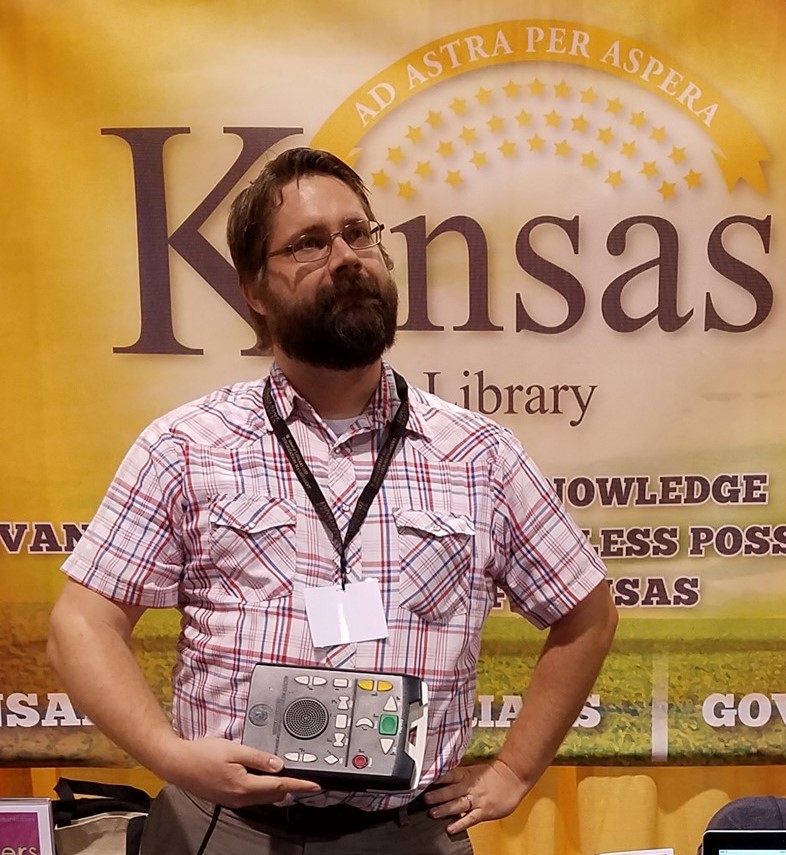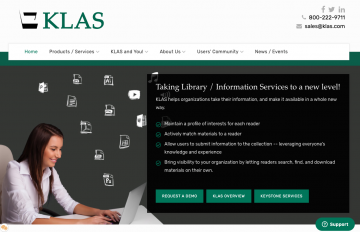- Andrea Callicutt
- News
It was only a matter of time. In December one of our own, John Owen, contracted COVID-19 and spent two weeks off of work fighting it. Thankfully he recovered and has not experienced any of devastating or long-term side effects.
Troubled by the lack or therapeutics available to COVID patients John jumped at the chance to help one of the most vulnerable communities. As soon as he was able, he donated his plasma that now contains the antibodies that can help those who are critically ill have a better chance at recovery.
John said this about his plasma donation:
“I’ve done it once and found out that I can continue to donate plasma every seven days until my annual limit. One small needle prick and an hour in a recliner is nothing compared to the chance that my donations can help critically ill patients have a fighting chance at recovery. This disease is no joke, and I am so thankful that my wife and family have so far been spared.”
Some photos John took during the donation procedure and of his "badge of honor" stickers.
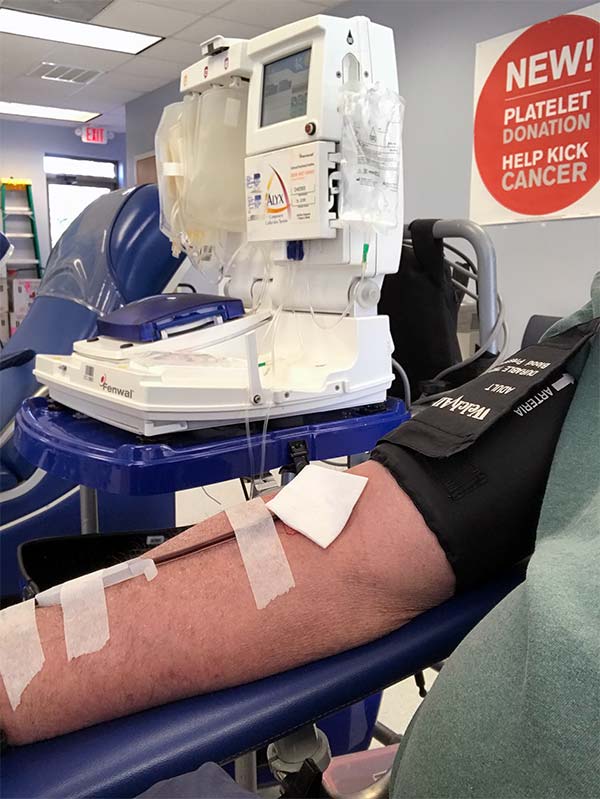
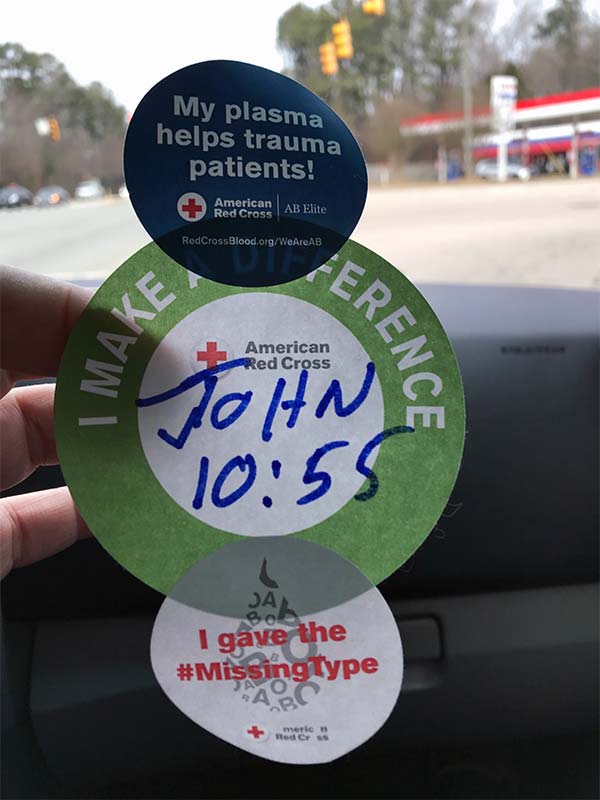
- Andrea Callicutt
- News
Your KLAS Development Advisory Committee (KDAC) member-representatives want to hear if you have input for our next meeting to be held January 19, 2021. Therefore please complete this survey to share your input with us, and please know we sincerely appreciate your thoughts and feedback.
- Andrea Callicutt
- News
We wish you a Happy and Healthy Holiday Season! May you in find joy and warmth in the holiday lights and comfort knowing a new year is just around the corner! From our homes to yours...here's to a cheerful holiday and a fresh 2021!
Our office will be closed Thursday, December 24, and Friday, December 25, 2020 in observance of Christmas. Regular support hours will resume on Monday, December 28, at 8:00 AM ET. The office will also be closed on Friday, January 1, 2021 for New Year's. Regular support hours will resume on Monday, January 4, at 8:00 AM ET.
If you need to arrange special support hours for these days, please call or e-mail us as soon as possible.
- Andrea Callicutt
- News
"Duplication" is the word of the day / week / month / year for National Library Service for the Blind and Print Disabled network libraries. Whether you've already made the fundamental shift to providing duplication on demand materials for your patrons or are still trying to make decisions about how to shift your library to a duplication on demand service model, there's many questions, decisions, and challenges faced during the process.
With this in mind, the KLAS Users' Group Program Committee is providing another opportunity for KLAS Users' to come together in a session focused on this topic. Go ahead and mark your calendar now for the upcoming KLAS Users' Roundtable: Duplication on Demand to be held on Tuesday, December 15 at 3 PM Eastern / Noon Pacific.
Note: We expect this session to last two hours rather than the usual one. Also, we plan to record this roundtable and post it to klasusers.com for later reference.
During this roundtable, three representatives of libraries using Gutenberg and three representatives of libraries using Scribe will each discuss their experience implementing duplication equipment, decisions regarding policy and staff changes, and more! After each shares a brief description of their process, there will be an opportunity to ask questions, discuss issues they've brought up, etc.
Gutenberg Panellists:
- Hope Williams, Nevada Talking Book Services
- Elke Bruton, Oregon Talking Book & Braille Library
- Ricardo Cisneros, San Francsico Public Library - Talking Book and Braille Center
Scribe Panellists:
- Connie Sullivan, South Dakota Braille & Talking Book Library
- Angela Fisher Hall, Alabama Regional Library for the Blind and Physically Handicapped
- Nancy Holt, Idaho Talking Book Library
Before the roundtable...
To help you prepare for this roundtable we encourage you to review Duplication Info Quick Reference page where you will find articles, quick tips, how-to documents, and more related to using either Gutenberg or Scribe. Several of the documents have just been updated to reflect changes in recent versions of KLAS, so make sure to check those dates to make sure you have the most current info!
You can also help our panellists prepare for this session by posting questions to this KLASUsers Discussion Forum post. Of course, day-of questions are also welcome, but posting your questions ahead of time will ensure that we get to them (even if you can't make the session itself) and that the panellists will be able to consider their answers.
Access Info:
Tuesday, 12/15/2020 @ 3pm Eastern Time / Noon Pacific
To connect:
Google Meet Link: meet.google.com/rmv-fgvs-eba
Dial-in audio option:
US +1 575-459-0037
PIN: 950 920 249#
- Andrea Callicutt
- News
Staff of Network Libraries for the Blind and Print Disabled using KLAS met for a virtual session on Wednesday, December 2 during the Online National Library Library for the Blind & Print Disabled's 2020 online national conference. Below is the PowerPoint presentation Keystone shared in both .PPTX and .PDF formats and the notes from the meeting as taken by Erin Pawlus, Secretary, KLAS Users' Group:
- KLAS Users at NLS 2020 - PowerPoint
- KLAS Users at NLS 2020 - PDF
- KLAS Users at NLS 2020 Notes - MS Word
- KLAS Users at NLS 2020 Notes - PDF
- Andrea Callicutt
- News
Today we wanted to prepare you (with a hat tip to David Bowie) to "Turn and face the strange [PIMMS] Ch-ch-ch-ch-changes," as PIMMS is adding a couple new statuses for Machines.
One will be "Awaiting Repair" which is not big news. However, to accurately get PIMMS up to date for this status this we will need to work with your KLAS Administrator to remap some existing KLAS CorStatus/MatDisp combinations.
The bigger change will be a Machine Status of "Transferring Status". This status will be used whether this is a direct transfer of a machine from one library to another or if the machine is field transferring from one patron to another. We have updated KLAS to add multiple Transfer (TF) Material Disposition codes to support this status.
New PIMMS TF Material Disposition Codes:
- Transferring Out (TFO) -- Machine is in the process of transferring out directly from one library to another. (This is an update of the existing TFO status code.)
- Transferring Out with Patron (TFP) -- Machine is in process of being transferred out with a Patron to another Library.
- Transfer Rejected (TFR) -- Either the Machine transfer or the Patron transfer has been rejected by the Gaining Library
Tranfer Accepted (TFA) -- The machine or Patron transfer has been accepted by the Gaining Library.
Libraries will not need to do any set up for these new codes. They will automatically added to KLAS with the upgrade. Existing machines that are Transferring Out (TFO) will be updated to Transfer Accepted (TFA) if the machine exists elsewhere in PIMMS.
Things to keep in mind with these new PIMMS Machine Transfer Statuses:
- If the machine is tranferring along with a patron, nothing will need to be done to transfer the machine--it will now be included along with the Patron transfer. Also, the library receiving the machine does not have to do anything to add it into KLAS, it will both be automatically added with the patron.
- If a machine should NOT be transferred with a patron, the library needs to remove the machine from the patron's record before transferring the patron record.
- If a machine or patron transfer is rejected, the machine changes to Not Available for Circulation / Transfer Rejected (NAC / TFR) and the patron will keep a Tranfer (T) status. There are new reports in KLAS that can be run to identify machines and patrons with this NAC / TFR status. The library will then need to figure out what they want to do these Machines and / or Patrons.
Please contact KLAS customer support to get help preparing for the Awaiting Repair status or if you have any questions about how the new Transfer Material Disposition are being used / what they mean.
- Andrea Callicutt
- News
Staff of Instructional Resource / Materials Centers using KLAS met for a virtual session on Thursday, October 9 during the Online American Printing House for the Blind's 2020 annual meeting. Below is the PowerPoint presentation Keystone shared in both PPTX and PDF formats:
- 2020 APH KLAS Users Meeting - PowerPoint
- 2020 APH KLAS Users Meeting - PDF
- Andrea Callicutt
- News
This week's post shares some insider info about our Software Development Project Lead. Read on to learn something new about Brian...
Basic Stats:
Name of Staff Member: Brian White
Year Hired: 2004
Current Job Title: Software Development – Project Lead
Getting to Know You Q&A:
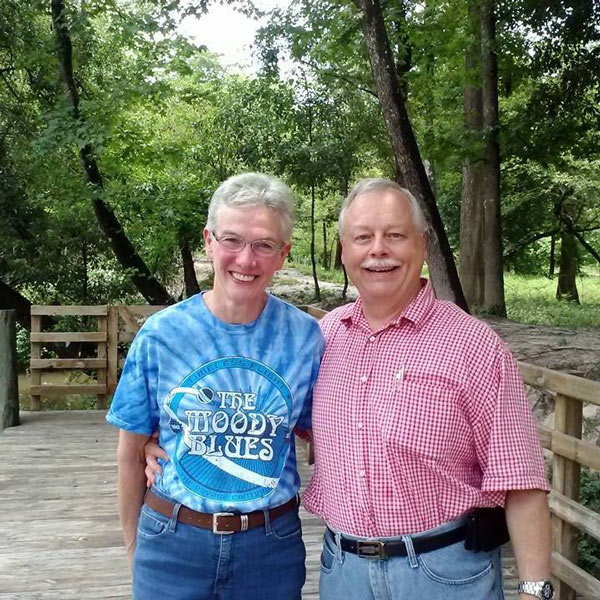 Q: What is your favorite part of your job?
Q: What is your favorite part of your job?
A: Piecing together the parts of a software process to make something that will make someone's job easier.
Q: What did you do before working for Keystone?
A: Worked for a programming staff supplement service. I worked at 2 customer sites over the 20+ years there.
Q: What are your hobbies outside of work?
A: Singing in a church choir, playing handbells.
Q: If you could go anywhere on vacation, where would you go?
A: Australia
Q: Do you have any pets? If so, what kind and what are their names?
A: We are currently without pets. We have had dogs, cats, guinea pigs, and a rabbit in the past.
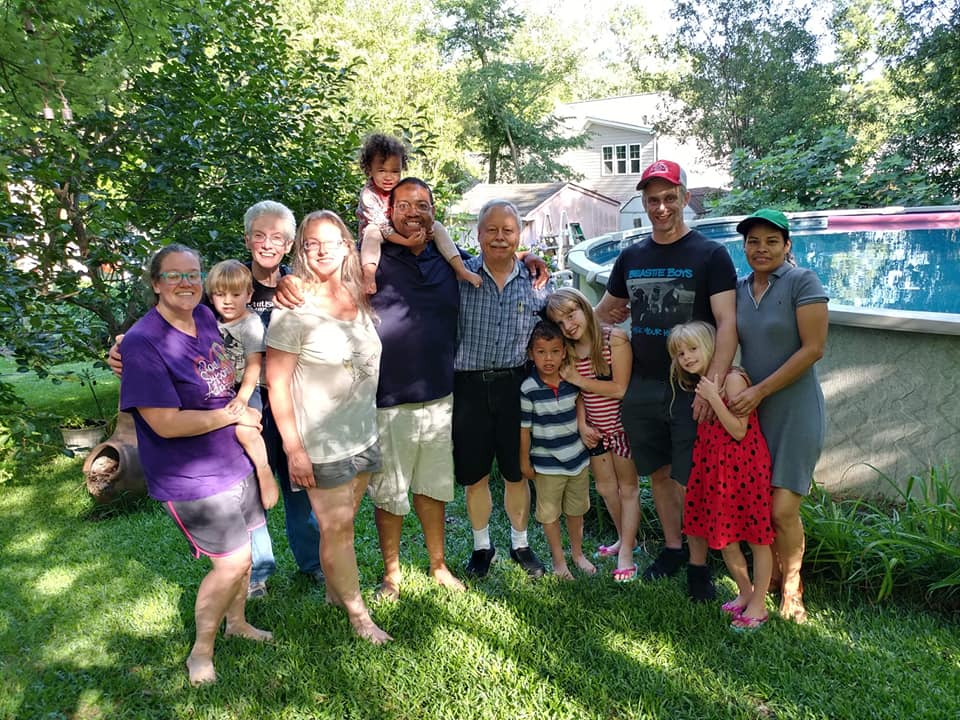
- Katy Patrick
- News
NLS has requested that we (and the other NLS providers) extract and submit some data for them to review. For each of our NLS Libraries, we will be providing NLS with the following statistical information on October 1.
We will be generating these data files for NLS and submitting the information to NLS directly, so you don't need to do anything. We will also send a copy to each library, so you know what was sent to NLS and can review the data for your own information.
Readership: a list of all patrons that received materials from the library during Fiscal Year 2020. The list will include the Patron PIMMS ID, whether they are marked Individual or Institution, and whether they received at least one of the following during FY 2020:
- Digital Audio book
- Hard Copy Braille book
- E-Braille brook
- or Network Library collection item
Note that audio and hard copy braille readership activity includes both books circulated by the library and magazine subscriptions sent by NLS. Network library collections include large print books, descriptive videos, and local magazines. BARD download activity is not included, as NLS already has that information.
Circulation: a count of all circulations this year broken out by library and by medium: Talking Books on Cartridge; Hard Copy Braille; and E-Braille on Cartridge. Circulation counts include counts for book/monograph circulation only. Local magazines/serials sent on cartridge are not part of these counts.
Note that Audio circulations are a count of the number of titles sent on cartridge instead of the number of cartridges sent. Hard copy braille circulations count the number of volumes sent, e-braille is the number of titles sent.
A note about the Readership & Circulation Report: Be aware that the number of people in the Readership list we provide to NLS probably will not match the total from your Readership & Circulation report. The R&C report total includes all accounts that you have updated that year, even if they did not receive something. With that in mind, if you have questions about how these lists do and do not line up with your R&C report, please let us know.
- Katy Patrick
- News
A couple of years ago now, we started offering webinars to help keep the Users’ Group informed and connected, from the open forum KLAS Q&A with Katy webinars to library-specific Duplication training webinars. As we transition to an every-other-year conference format, we’ve ramped up the webinar schedule, including user-led sessions and roundtables in addition to our Keystone-presented sessions.
COVID has only increased the need and popularity of these sessions—and not just for us, but for everyone who uses webinar platforms.
For most of the past few years, we’ve been using Join.Me and had mostly positive experiences and feedback for its ease-of-use and reliability. However, with offering so many more webinars to a broader selection of our users, and with Join.Me’s servers a bit bogged down from increased use, there was a definite shift.
This was particularly apparent in the Keystone Updates and New Features in KLAS sessions that we held in place of our usual Users’ Group meeting during the online NLS conference. The turnout for those sessions was fantastic, but unfortunately caused a few technical issues as our platform and our moderator struggled to keep up with the turnout.
In light of all that, we started the search for a replacement.
This month, we are officially making the switch to Google Meet. From our testing in-house and with a few pilot meetings, we’re confident that it will be easier for us as hosts, and will see a lot less of the lag that was plaguing our attendees.
It also has some features that we think will prove beneficial, including automatic captioning, and the ability to show attendees’ webcams in a tiled display for a better “round-table” feel. You’ll be able to enable or disable the captioning and change views any time to suit your preferences, so give it a try!
You do not need a Google account to join us using Meet! However, if you are logged into a Google account, it’ll automatically bring you into the meeting with that account name. If you don’t want your personal or otherwise irrelevant Gmail name visible make sure to log out or switch accounts before joining the meeting.
We hope you’ll try it out and join us at the upcoming Virtual Programming roundtable this Thursday or at one of our other upcoming webinar sessions! Hopefully, this will be an improvement for everyone who had technical difficulties or bandwidth issues with Join.Me. If you do have any feedback about the new platform or difficulties joining a session, please let us know as we keep working to provide excellent online sessions!
- Andrea Callicutt
- News
Here in North Carolina we usually think of late summer / early fall as the start of hurricane season. Well, this year is different (as is everything else in 2020) and we've already had a couple of named hurricanes develop, with one hitting Outer Banks in late July. Therefore, we wanted to go ahead and review what we do ensure we can continue to serve your library, your staff, and your patrons after a natural disaster, and share the additional improvements we've made this year to our Disaster Preparedness and Recovery plans. We've spent a significant amount of time building infrastructure, reviewing procedures, and planning for an untimely incident.
In fact, much of what we put into place as part of our disaster preparedness plan is what allowed our staff to begin to work from home in March and continue to do so even today and for the foreseeable future.
Our September 11, 2018 Key Notes Blog Post was written as we faced the threat of Hurricane Florence and shared details about we'd implemented at that point including a combination of both procedural and physical preparedness such as:
- A gas-powered generator at our office
- Redundant internet providers, firewalls, and network routers
- Daily backups of data to our on-site servers
- Weekly data backups stored offsite
- Encrypted database backups on AWS S3
- VOIP Telephone system to allow staff to work remotely
- Keystone Status Page to communicate database availability, even if we’re unreachable
- Contingency plans and equipment needed for remote database and customer support
On August 15, 2019, Katy posted to share the news of some additional steps we'd taken to further enhance our disaster preparedness and recovery efforts including:
- Back-end changes to KLAS 7.7 to it quicker and easier to create and store database back-ups
- A move to storing back-ups in the cloud, so they are safe and retrievable no matter where disaster strikes
A new monitoring app so staff can be notified right away if something goes wrong with the servers and any emergencies can be dealt with as quickly as possible
Today I'd like to share this year's improvements to our disaster recovery and preparedness process and infrastructure, which include:
- Cloud-based databases running in multiple regions, to better place the system geographically near the library
- Incremental transaction data backups happen every 10 minutes
- Database backups are saved in the local region, as well as to a separate region. If a database hosted on the east coast has a disaster, there is a copy of the database backup in another region.
- Database backups are saved to the local server, as well as copied to S3 storage
- Database backups are also copied from Amazon's data centers to Google Storage
- A new automated system restoration process which had been manual prior to the beginning of 2020. As an automated process, it takes about an hour while the previous manual process took 10-12 hours at a minimum.
- Katy Patrick
- News
One of the new features in the 7.7.36 update is the ability to Shuffle a Service Queue.
This feature was suggested by Arizona Talking Book Library staff, and I think a lot of you who are have transitioned to a Duplication service model will definitely be interested in it
From the Release List:
A function has been added to shuffle a Patron's Service Queue. This will place all titles currently in the Queue into a new, random sequence order, then rearrange titles that are in an Ordered Series to ensure that they are in order relative to each other.
This update is scheduled to be released at the end of the week, so let’s take a look!
The idea behind this feature is knowing that when patrons submit Talking Book Topic requests they come in with everything grouped by genre Duplication means that all these titles are available to everyone and patrons will get all of those requests in order (i.e. all of their Mysteries in a row, then all of their Romances, and so on).
Additionally, adding a long request list straight to the queue using Quick Request will add the list to the top and push down any outstanding requests still waiting to be duplicated. A patron may want some of the new titles right away, but they also might be looking forward to the other titles.
The Shuffle function allows you to mix things up without the need to manually rearrange all the titles. After you use Quick Request to add a patron’s TBT requests to their queue, use the Functions menu, and select Service Queue > Shuffle Queue. The new requests will get mixed into any previous requests that were still waiting in the queue, and everything will be randomly ordered without regard for genre. You're essentially doing an automated card shuffle of their queue.
For example:
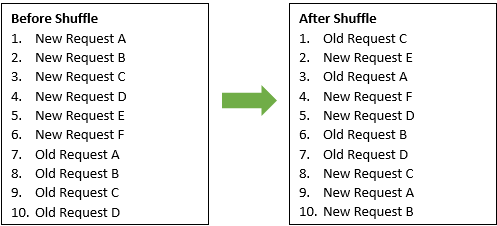
If they have any book from an ordered series in their queue when you shuffle it, KLAS will add an extra step to the process.
After the whole queue is put into random order, it will then re-arrange just those series titles to put them in sequence with each other, while leaving them scattered through the other results. The patron won’t necessarily get them all in a row but will get the books in the right order.
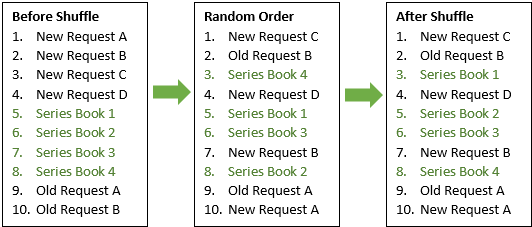
This will also work if a patron has multiple series—the different series can get interspersed with each other. For instance, “Series A Book 1” will come before “Series A Book 2,” and “Series B Book 1” will come before “Series B Book 2.”
Finally, you can still use the arrow buttons in the toolbar (Or Ctrl plus the Up or Down keys) to make manual adjustments. So, if one or two requests are starred, circled, and / or have a great big “Send this first!!!” written next to them, you can easily bump them up to the top once the rest have been shuffled.
I hope this helps you understand how the new feature works and when you might find it helpful!
Keep an eye out for the full 7.7.36 Release List later this week. Finally, be sure to let us know if you have any questions about this or the other new features, improvements, and bug fixes.
- Andrea Callicutt
- News
Last week we updated you on how our Washington, New Mexico, and Kansas talking book libraries are faring as their staff and patrons continue to face the ongoing challenges of keeping themselves healthy and safe while operating during COVID-19. Today we want to bring you a similar update from Keystone.
Since mid-March our staff has primarily been working from home and continues to do so. This would not have been possible without using our established VPN and VOIP services. These have allowed us to access necessary documents and information and continue seamlessly answering customer phone calls. We hope you have not seen a dramatic change in our customer support or development process other than the occasional dog bark or child interruption which I am sure we've all come to expect at this point. If you've had any degradation in service of any kind, please let us know ASAP so we can address it.
Also, this was the first year without a physical KLAS Users' Conference and we sincerely hope the online programming brought to you by your fellow KLAS Users and our Keystone staff have helped to keep you up to date on the latest happenings with Keystone and KLAS as well as continue to hear what you're fellow KLAS Users are up to. Speaking of these ongoing efforts, our next KLAS Users Roundtable will be held at 3:00 PM EDT September 17 and will focus on Virtual Programming for Patrons. More info will be forthcoming shortly. Keep an eye on the KLASusers listserv and our Webinars & Roundtables article for more info.
A new initiative we've undertaken is to move our planned September KLAS Administrators' Training online. For the first time, we will be offering this training for your staff members to be able to attend remotely, eliminating the need to travel to our office. We're revamping the schedule, rethinking the sessions offered, and talking through the best way to conduct this training so attendees can fully benefit from it. This first session will be kept to a small number of participants, so we can try to encourage the discussions and dialog that have made face-to-face Administrators’ Training so successful. The price per person for this online admin training is $600.00, but there obviously are no travel costs to incur. Please let us know if you may be interested in attending a future online KLAS KLAS Administrator Training session.
- Katy Patrick
- News
Previously, we've shared a number of guest blog posts on how COVID-19 is affecting KLAS libraries and resource centers. Since then, there has been plenty of re-opening, re-closing, and re-evaluating as each state and all of their associated agencies work to find the best course of action.
We recently reached out to our original guest bloggers for an update on their situation. Read on to see how things have progressed in Washington, New Mexico, and Kansas.
And if you would like to share how your library / organization is faring, and what policy, service, or other changes you have enacted in response to Covid19, we still welcome submissions from any KLAS user. Please contact Chandra Thornton, Past President, KLAS Users' Group or Drea Callicutt, Keystone Systems if you're interested in contributing a post.
Sam Lundberg, New Mexico State Library for the Blind & Print Disabled
I said in my original post that New Mexico would be able to hold at current levels, and that's basically what we've done. Books are going out and coming in, processed by two staff members who are never in the building at the same time. We're also answering the phone live thanks to call forwarding and Google Voice, providing full RA service from home. Small, random things like sending out a paper application are more difficult than they were before, but we're in a sustainable place.
The only real change we've had is that we're finally wrapping up our conversion to DoD. After 9+ months of slowly transitioning patrons one conversation at a time, we're finally bulk converting our remaining patrons. It is very exciting to finally be going fully to Scribe for book delivery, although the fate of our carousel system is now very much an open question.
(Read the original New Mexico post)
Danielle Miller, Washington Talking Book & Braille Library
On June 2nd, our Governor approved a waiver request for the Washington Talking Book & Braille Library to begin circulating books and materials during Phase 1 of our “Safe Start” plan. On June 4th, we resumed circulation with four staff returning to work to join the director. We had over 40 mail bins of returned books and equipment that still needed to be checked in and thousands of patrons waiting for books. Working as a team, everything was checked in and everyone was served in record time. Circulation was operating normally, with all staff wearing PPE and following safety protocols. The director was still checking voicemail daily and responding to patrons, and most staff were still working remotely.
When our county moved into Phase 2, on June 29th, more staff were able to return to the library. We were able to start answering the phones and resume regular readers’ advisory. Some staff continue to work from home and the library is still closed to the public and to volunteers. We are busy answering phones, circulating books, continuing work in our Audio and Braille Departments, and all staff at the library are helping with book inspection daily. We are looking forward to the time we can have all of our staff together and slowly bring our volunteers back. Ensuring everyone’s safety is the highest priority, and we want to do what we can to avoid another disruption in circulation.
(Read the original Washington post)
Michael Lang, State Library of Kansas, Talking Books Service
Present: Still Doing the Best that We Can
We are still working with the model we implemented in April.
The circulation staff and I are working on site. We are allowing returned books and machines to sit untouched for a minimum of three full days in our library before handled by staff. The good news is that mail is again being delivered and picked up at our building by the USPS. No more daily runs to the post office in my mother-in-law’s truck.
RA staff are still working remotely; answering phone calls, emails, updating catalog records, editing audio, creating book lists, and looking for online continuing education opportunities. Our VOIP phones and splashtop connections are saving us from the early frustrations we were having. If there is something they need to do onsite, they can schedule a time with me to come in to work. They will return onsite fulltime when the following criteria have been met:
- The ESU Memorial Union is open
- Lyon County enters the phase out stage of Gov. Kelly’s Ad Astra recovery plan
- The State of Kansas enters the phase out stage of Gov. Kelly’s Ad Astra recovery plan
Our volunteer recording program is on hold until further notice. Circulation staff are recording our local magazines to keep them as current as possible.
Cases are currently trending upward in Kansas. On July 15, Kansas Governor Laura Kelly announced that public schools will not reopen until after Labor Day.
Emporia State University buildings are scheduled to reopen to the public on August 3rd, masks will be required for everyone on campus. Students will return beginning August 12th. They’ve shut off the water fountains in our building.
I feel like we’re managing to serve our patrons pretty well. The turnaround time is a little slower for books, but increasing cutoff limits for underserved patrons keeps most people in books. Most patrons have been very understanding. I think our biggest loss will be outreach. All outreach events for the year are cancelled. Trying to find new avenues to reach prospective patrons is difficult. If you’ve got any advice, we’d love the help.
(Read the original Kansas post)
- Chandra Thornton
- News
I hope you are all well and in good spirits. It is my honor and privilege to announce that Michael Lang of the State Library of Kansas, Talking Books Service will serve as KLAS Users' Group Vice President for the 2020 - 2021 year. Please join me in congratulating Michael on this new and exciting endeavor. Michael will officially step into this role on August 1, 2020.
Thank you to all that voted!
Best Regards,
Chandra Thornton
KLAS Users' Group President
- Andrea Callicutt
- News
In March of this year, Katy and I undertook a rather large project that we're now happy to see come to fruition. For the past few years, we've been discussing updating the look and feel of Keystone's website with the goal of creating something more modern, with some additional features, but still maintaining our commitment to providing info on an easy-to-use and easy-to-navigate site. To help us with this endeavor, we chose to work with Alison Meeks of AM Graphix. We're excited to say that as of yesterday, the new and improved klas.com is now live!
The content we previously provided is still available, but we hope we've enhanced it and made it all easier to find. One of the great new features we added for current KLAS Users is the ability to submit a "Support" request from any page on the site using the "Support" button in the right-hand corner. Also, the whole site is mobile-friendly and responsive to the size of your browser window.
Below are some additional screenshots of the shiny, new klas.com. We invite you to spend some time checking it out!
The Current Customer OPACs page has been updated to a modern, graphical style, showcasing the logo of each library or organization in addition to the text name. It has also been broken into new sections: Featured, Talking Book Libraries, and Instructional Resource Centers. (Note: Prefer a text-only approach? We've added that version of the list to the KLASusers.com menu!)
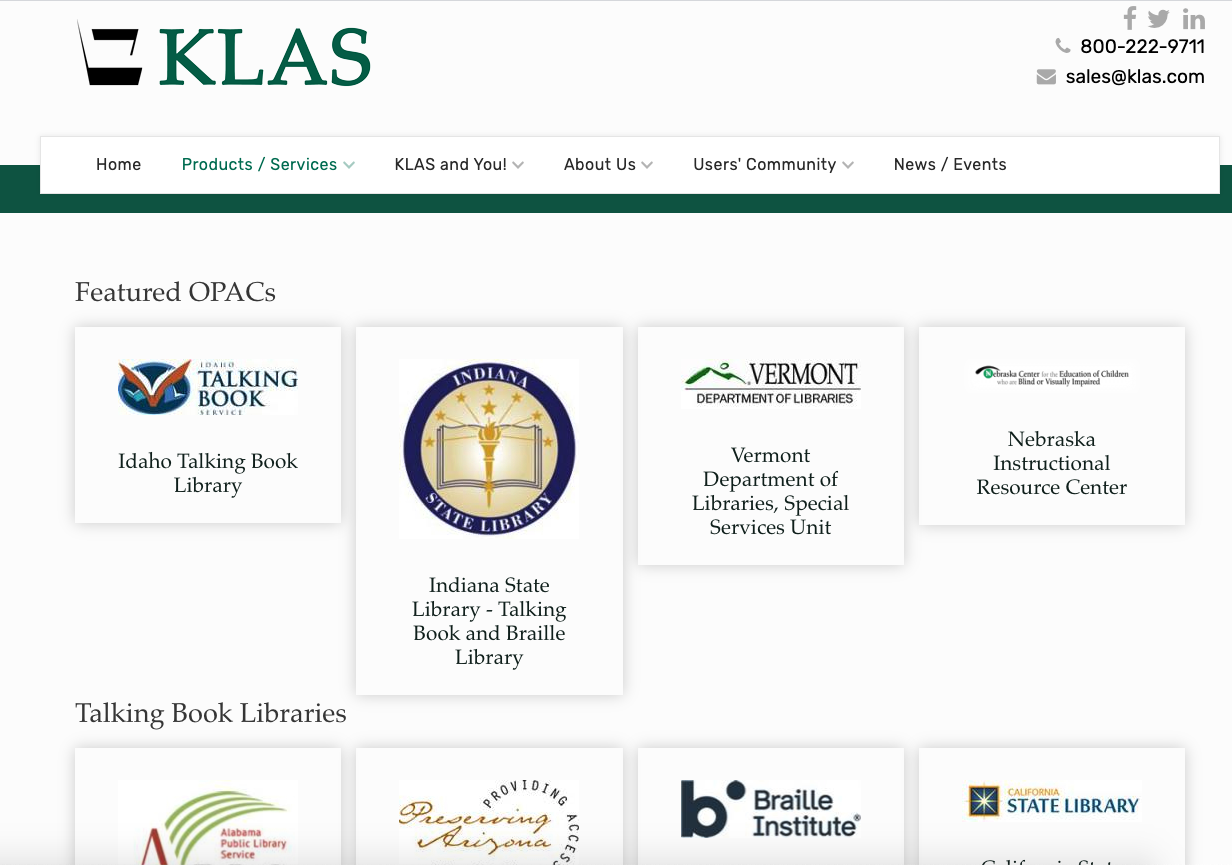
The Products and Services: Scribe Duplication System page is new! It includes information about the Scribe, as well as some photos.
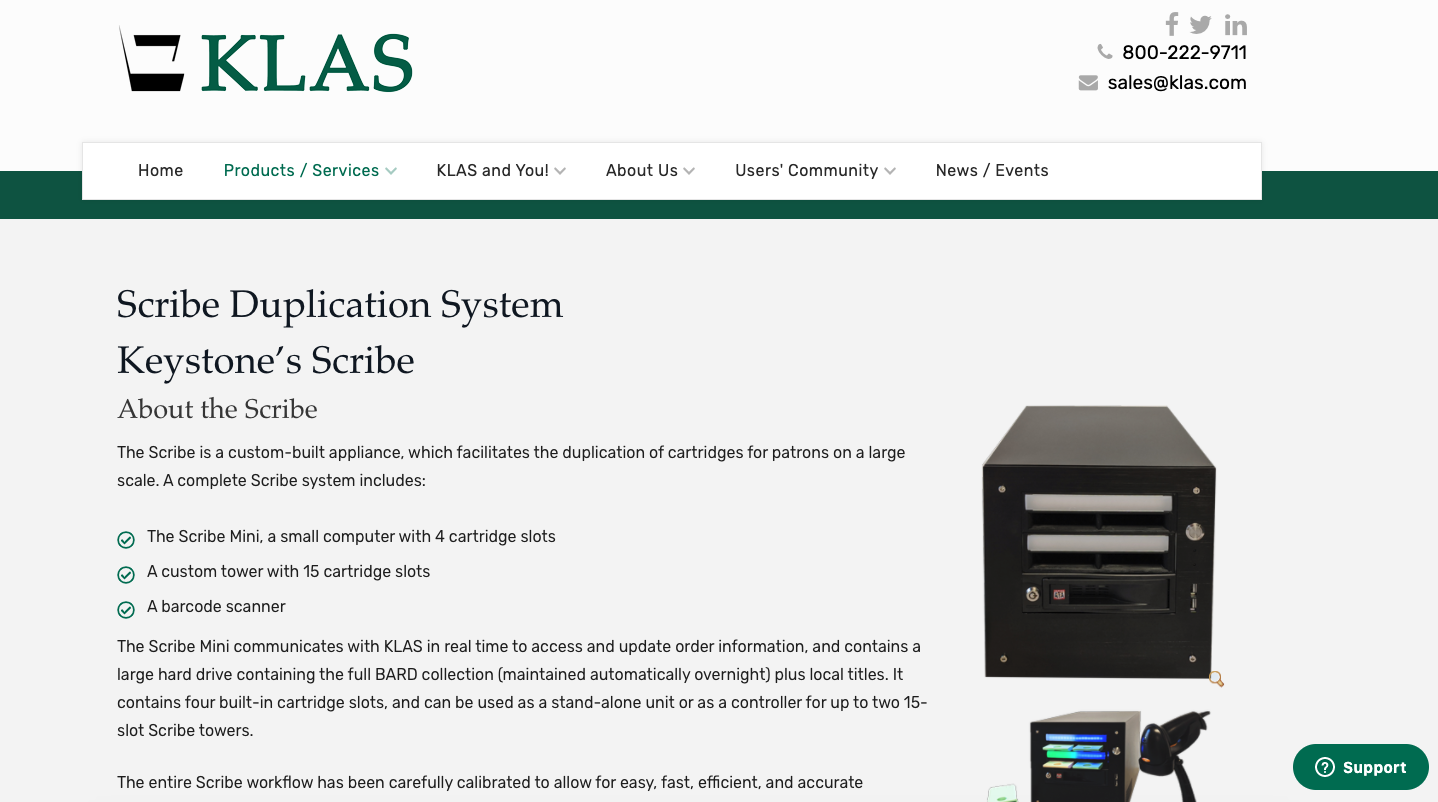
We've included some new testimonials from KLAS users on the home page. Thank you to everyone who provided a quote for us--we appreciate your kind words and support!
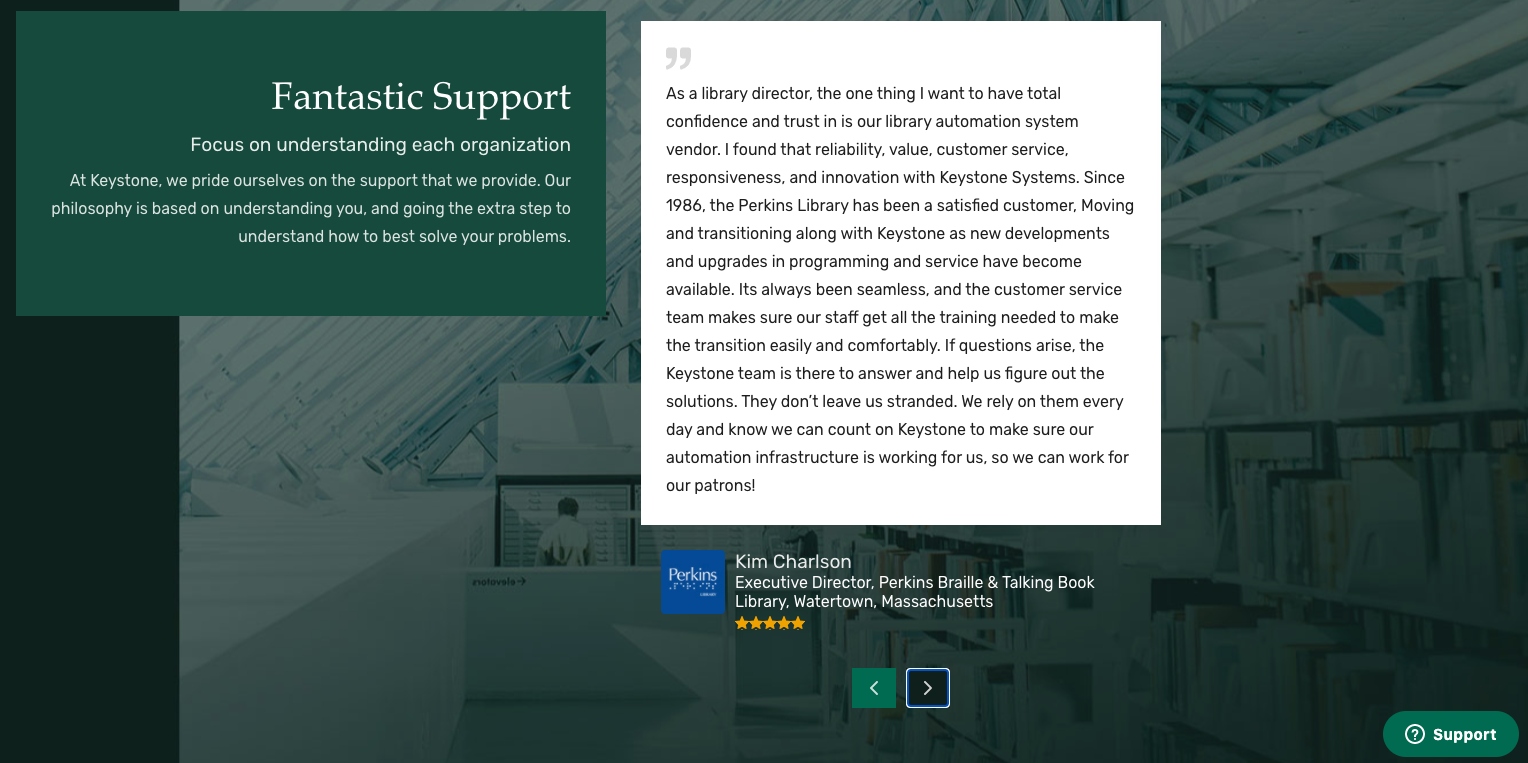
Finally, this is and will be an ongoing effort. Now that the new look and new organization is in place, we have plans to edit much of the content, so we'd love to hear your feedback!
- Andrea Callicutt
- News
COVID-19 has thoroughly upended almost all of our "typical" workdays, routines, and daily lives. It's affected each of us in very different, but very substantial ways. This Spring brought changes to how Keystone and many of our libraries operated. We've seen shifts in patron service models, circulation policies, and staffing scheduling and environments. In the last month, some agencies began to open back up and deal with the repercussions of limited staff, quarantining materials, backlogged items waiting to check-in, etc. while others may be facing another shift as state reevaluate their plans to reopen with the newest surge of cases. No matter where your organization or staff are in this process, we're doing our best to continue supporting you. Yet, we also know we aren't the ones dealing with the day-to-day, and only others in similar circumstances can relate and offer the best advice for you at this time. Therefore, today I am taking some time to again share relevant COVID-19 related KeysNotes blog posts from our staff as well from other KLAS Users.
The posts are in order from oldest to most recent.
Keystone Authored KeyNotes COVID-19 Related Posts:
- Important Coronavirus Info
- Working Remotely Tips & Tricks
- Working Remotely Tips & Tricks Part II
- A Note from James, plus Tips & Tricks Part III
- Tips & Tricks - Back to the Stacks
Yet, we also know we aren't the ones dealing with the day-to-day, and only others in similar circumstances can relate and offer the best advice for you at this time. Therefore, here are the words of your colleagues written in response to our request for input about what policy and procedural changes they've made in response to this unprecedented shift in how we all function.
KLAS Users Authored KeyNotes COVID-19 Related Posts:
- COVID-19 and the Washington Talking Book & Braille Library
- COVID-19 and the Florida Braille and Talking Book Libraries
- COVID-19 and New Mexico State Library, Library for the Blind & Print Disabled
- COVID-19 and the California Department of Education Press
- COVID-19 and State Library of Kansas, Talking Books Service
- COVID-19 and TN RCVI
- COVID-19 and the Arizona Talking Book Library & Instructional Resource Center
- COVID-19 and NC LBPH
-
Bonus Post
In March, Keystone staff shared something a bit more lighthearted and published some of their favorite recipes to cook in their home kitchens while self-isolating. You can check them out in this post: Keystone Quarantine Kitchen
- Katy Patrick
- News
Since this is an off-year between KLAS Users' Group Conferences (and what good timing that was!), we've been working with the Programming Committee and your fellow users to bring you periodic online content to help keep you connected and tide us all over to the next conference.
We hope this is a good opportunity for folks who can't usually attend the conferences to get a taste of them, and that they've helped you keep up-to-date and involved. But to make sure we're succeeding--and to get even better--we need to hear from you!
If you haven't yet taken the KLAS Users' Online Programming Survey, please take a few minutes to provide your feedback. It's incredibly valuable, and will help bring you even better online content in the future. We've done our best to keep the survey short and sweet, and it'll inform not only our Fall programming, but maybe even online offerings at future in-person conferences!
Of course, if you have more opinions on the matter than you can fit into the survey, we're always happy to add more voices to the Programming Committee. As Erin says in her invitation for new members, "Being a part of a conference planning committee is a terrific way of getting to know other colleagues and putting a voice to the names!" If you're interested, or just want more info, shoot an email to .
Finally, you know what one of the best things is about online content? That you can always catch up after the fact!
So if you've finished the survey and still find yourself with a little down-time, make sure you're logged in and then follow these links to catch up on what you've missed:
- 5/19/2020 Online KLAS Users' Meetings (Includes links to the Overview of Keystone Systems Updates, KLAS Updates & New Featuresfor Talking Book Libraries, and KLAS Updates & New Features for Instructional Resource Centers sessions)
- 04-23-20 KLAS IRC Users' Roundtable
- 03-19-2020 KLAS Users Roundtable: Duplication on Demand
- 02-20-20 KLAS Q&A with Katy Recording
- Andrea Callicutt
- News
I wanted to take some time today to write about a group of our users' that I get to spend more time with than most -- our KLAS Users' Group Officers. In the nearly 18 years I've worked for Keystone, I've had the opportunity to collaborate with a number of different persons and personalities who y'all selected to fill these positions. I've facilitated in-person and online elections, been the Keystone representative to committees they lead as the chair, watched as the Users' Group became more fully involved with and proactive about helping to create and produce programming at the Users' Conference and now beyond. I've seen the Users' Group Bylaws evolve and a whole new officer cycle was instituted last year. We're now in the first election under this new model, and I'm excited at the prospect of having someone new with whom to plan and work.
With that in mind, I'm taking this opportunity to thank you all for teaching and inspiring me. Officers Meetings are places where we get the hard work done, but also connect with one another and sometimes have a good laugh. I know that the personal relationships I've established have led me to better understand the challenges you face in your day to day operations. I've even been lucky enough that I now call some of y'all friends. Keystone and KLAS are here to support you, but you're also here to support us. Your input as officers, committee members, presenters, and even conference attendees helps shape the future of what we're doing so we can better serve you and your patrons. Thank you.
So, now it's time for the Users' Group to select a new Vice President who will become your President in a year's time. No matter who your nominees are and final selection is, I welcome them and hope they will also gain from their experiences working as part of this group as much as I have. To help everyone better understand what role they are stepping into, I asked our current KLAS Users' Group Vice President to share some insight into her duties and responsibilities over the last year. This is what Jen Buzolich, California Department of Education Clearinghouse for Specialized Media & Technology, shared:
For me, the role of the Vice President has primarily been about learning how the Users' Group functions and our roles in supporting all KLAS users and helping to bridge the users and Keystone. I have appreciated being able to bring a voice from the IRCs, while at the same time learning more about the DTBLs. Having balanced representation in the Users' Group between the two groups has been, in my opinion, very beneficial.
Therefore, I ask you to take some time to read over the bios and statements of purpose from your nominees for KLAS Users' Group Vice President once they are published and seriously consider who you want to become your new Vice President and eventual President. They will help shape your experience as a user, the future path of KLAS and Keystone, and be part of a great group of individuals who have shared and learned much from one another in the act of serving your KLAS Users' Community.
- Katy Patrick
- News
Hello everyone! Today, I'm bringing back (and updating!) a post from 2018. This is important info we want to make sure you know about and remember, so let's dive in...
Keystone, KLAS, & Accessibility
Easy access to all features and functions within KLAS has been integral to all phases of the design process since the first version of KLAS, and continues through our ongoing work developing the next generation of the program.
From our first library customer, North Carolina Library for the Blind and Physically Handicapped, Keystone has had a commitment to develop library software and provide support services for all of our users. Now that KLAS is installed and being used by nearly 2/3 of the network libraries that are part of the Library of Congress' National Library Service for the Blind and Physically Handicapped as well as a number of Instructional Resource / Materials Centers, we have a multitude of staff (as well as public catalog users) performing a multitude of tasks and requiring varying levels and types of accessibility. To help meet the needs of our users, Keystone offers some additional support and services. Examples include:
- Keyboard shortcut access to KLAS
- Testing and troubleshooting of assistive technology software in conjunction with KLAS
- Customized accessibility training for the workflow and AT used by a specific staff member
- Keeping accessibility in the forefront of design as we move toward developing new versions of KLAS
Keyboard Shortcuts
KLAS is fully navigable both by a mouse and by a keyboard. In fact, we have seen that it's faster to use a keyboard than a mouse when performing tasks such as entering a new patron or entering multiple subject codes to an item.
To help users learn KLAS-specific keyboard commands and shortcuts, we created a KLAS Keyboard Shortcuts Quick Reference Document. You can download it in either Word or PDF format from the "KLAS Keyboard Shortcuts" article.
Update: For those of you implementing Duplication service, make sure to check out the QuickRef - Duplication with AT document for all the Duplication-specific shortcuts! It's available on the Duplication Info page.
AT Testing and Troubleshooting
We do ongoing testing of various types of assistive technologies (AT) and their interaction with KLAS. If you are using AT with KLAS and find you are having trouble, please contact both your IT as well as our customer support staff. We may have seen the problem before with another user and already have a solution, or we may be able to help you figure out what's going on at least from the KLAS side.
Update: You may also want to grab the latest AT Reference Document and/or the QuickRef - Duplication with AT document from the Duplication Info page.
Accessibility Training
Another service we offer is assistive technology user training and workstation configuration. This service is for any staff member(s) that use assistive technology such as Jaws, ZoomText, WindowEyes, etc. It is a 5-day intensive one-on-one training session done at your staff person's workstation based on their job responsibilities and the adaptive technologies or software they use with KLAS. Please note, your staff member should already be familiar with and using the latest version of their preferred AT software, this training is specifically to configure it and KLAS to your users' specific workflow and needs. Please contact us for pricing and availability.
Designed for All from the Beginning
Accessibility is a core part of our design process. As we look toward developing the new KLAS features and functionality, our commitment to accessibility from the beginning continues. The consideration of how to make all of KLAS' screens easily navigable and all its features intuitively presented will benefit those both those who use AT as well as those who do not.


